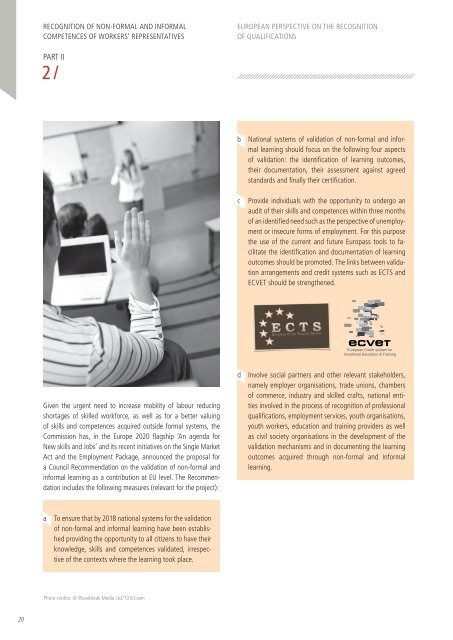RECOGNITION OF NON-FORMAL AND INFORMAL ... - Solidar
RECOGNITION OF NON-FORMAL AND INFORMAL ... - Solidar
RECOGNITION OF NON-FORMAL AND INFORMAL ... - Solidar
You also want an ePaper? Increase the reach of your titles
YUMPU automatically turns print PDFs into web optimized ePapers that Google loves.
<strong>RECOGNITION</strong> <strong>OF</strong> <strong>NON</strong>-<strong>FORMAL</strong> <strong>AND</strong> IN<strong>FORMAL</strong><br />
COMPETENCES <strong>OF</strong> WORKERS’ REPRESENTATIVES<br />
EUROPEAN PERSPECTIVE ON THE <strong>RECOGNITION</strong><br />
<strong>OF</strong> QUALIFICATIONS<br />
PART II<br />
2 /<br />
b National systems of validation of non-formal and informal<br />
learning should focus on the following four aspects<br />
of validation: the identifi cation of learning outcomes,<br />
their documentation, their assessment against agreed<br />
standards and fi nally their certifi cation.<br />
c Provide individuals with the opportunity to undergo an<br />
audit of their skills and competences within three months<br />
of an identifi ed need such as the perspective of unemployment<br />
or insecure forms of employment. For this purpose<br />
the use of the current and future Europass tools to facilitate<br />
the identifi cation and documentation of learning<br />
outcomes should be promoted. The links between validation<br />
arrangements and credit systems such as ECTS and<br />
ECVET should be strengthened.<br />
Given the urgent need to increase mobility of labour reducing<br />
shortages of skilled workforce, as well as for a better valuing<br />
of skills and competences acquired outside formal systems, the<br />
Commission has, in the Europe 2020 fl agship ‘An agenda for<br />
New skills and Jobs’ and its recent initiatives on the Single Market<br />
Act and the Employment Package, announced the proposal for<br />
a Council Recommendation on the validation of non-formal and<br />
informal learning as a contribution at EU level. The Recommendation<br />
includes the following measures (relevant for the project):<br />
d Involve social partners and other relevant stakeholders,<br />
namely employer organisations, trade unions, chambers<br />
of commerce, industry and skilled crafts, national entities<br />
involved in the process of recognition of professional<br />
qualifi cations, employment services, youth organisations,<br />
youth workers, education and training providers as well<br />
as civil society organisations in the development of the<br />
validation mechanisms and in documenting the learning<br />
outcomes acquired through non-formal and informal<br />
learning.<br />
a<br />
To ensure that by 2018 national systems for the validation<br />
of non-formal and informal learning have been established<br />
providing the opportunity to all citizens to have their<br />
knowledge, skills and competences validated, irrespective<br />
of the contexts where the learning took place.<br />
Photo credits: © Wavebreak Media Ltd / 123rf.com<br />
20
















